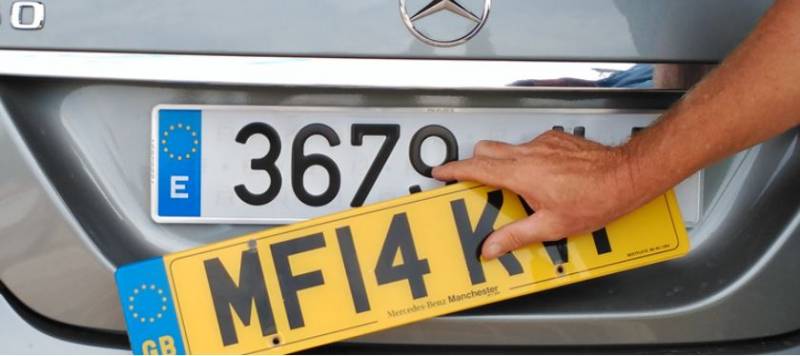The length of time Does It Require To Register a Foreign Vehicle in Spain? Discover
The length of time Does It Require To Register a Foreign Vehicle in Spain? Discover
Blog Article
Typical Obstacles Faced During Foreign Car Registrations and Exactly How to Get over Them
Navigating the complexities of foreign automobile enrollments can be a daunting task, filled with difficulties that differ dramatically throughout territories. Concerns such as analyzing regional guidelines, getting over language obstacles in essential documentation, and reconciling discrepancies in car specs typically develop. Additionally, comprehending tax obligation effects and conformity with safety and security requirements can additionally complicate the process. By checking out reliable approaches to attend to these obstacles, people can better place themselves for a smoother enrollment experience. The concern remains: what particular actions can be taken to alleviate these usual mistakes?

Comprehending Regional Laws
Navigating the intricacies of foreign vehicle enrollment starts with an extensive understanding of local laws. Each nation has its particular regulations and demands governing the enrollment of automobiles, which can differ dramatically from one jurisdiction to another (Register a foreign Vehicle in Spain). It is critical for foreign vehicle proprietors to familiarize themselves with these guidelines to guarantee conformity and prevent possible fines or lawful problems

Furthermore, some territories mandate car examinations to establish compliance with regional safety and exhausts standards. This could necessitate alterations to the car prior to it can be legally signed up. Engaging with regional authorities or speaking with legal specialists can offer quality on these policies.
Language Obstacles in Documentation
Language barriers posture considerable obstacles when it comes to the paperwork needed for foreign automobile enrollment. Numerous people run into difficulties in recognizing the specific demands detailed in neighborhood policies, as these papers are often published in the official language of the host country. Misconceptions can cause the entry of incorrect or incomplete documentation, resulting in delays or denial of registration.
Moreover, crucial files, such as title actions, evidence of possession, and insurance plan, may not have easily available translations - Register a foreign Vehicle in Spain. This can develop complication for international lorry owners who are unfamiliar with the regional terminology and legal jargon. Consequently, browsing the enrollment procedure ends up being difficult, usually requiring additional effort and time to ensure compliance
To mitigate these issues, it is recommended for foreign vehicle owners to seek specialist translation solutions or get in touch with neighborhood specialists that can help in comprehending the requisite paperwork. Furthermore, government agencies might give multilingual sources or guidelines to help with the registration process. Proactively resolving language obstacles can enhance the registration experience, guaranteeing that all required records are properly prepared and submitted in conformity with neighborhood guidelines.
Car Specification Disparities

Coming across vehicle requirements discrepancies can produce significant obstacles for international vehicle proprietors throughout the registration procedure. These discrepancies commonly arise from differences in making standards, measurement devices, and regulatory demands in between the lorry's native land and the host nation. A lorry that meets safety and discharges requirements in one nation might not straighten with the specifications required for registration in another, leading to delays or outright beings rejected.
To get rid of these obstacles, it is crucial for foreign vehicle owners to conduct extensive research study before starting the enrollment procedure. This consists of comprehending the certain demands established by the regional authorities, such as security requirements, discharges levels, and any type of required modifications. Engaging with a professional solution concentrating on international automobile enrollment can likewise offer important insights and assistance in browsing these disparities.
Documents plays a crucial function, so guaranteeing that all technical requirements and alterations are precisely shown in the paperwork can mitigate concerns. Furthermore, maintaining open communication with neighborhood registration authorities can provide quality on any kind of prospective discrepancies, permitting prompt resolution and successful enrollment of Full Report the automobile.
Navigating Tax Obligation Demands
Understanding the tax obligation requirements related to international car enrollment is necessary for owners aiming to abide by local guidelines. Each jurisdiction has details tax commitments that need to be fulfilled prior to a vehicle can be legitimately registered. These might include import tasks, value-added taxes (BARREL), and yearly car tax obligations, which can vary dramatically depending upon the lorry's origin, worth, and specifications.
To browse these tax obligation requirements properly, vehicle proprietors need to begin by looking into the specific taxes relevant in their area. Consulting with local tax obligation authorities or a tax obligation expert with experience in international lorry registrations can supply quality on the process and prospective responsibilities.
Additionally, it is vital to keep detailed paperwork of the automobile's purchase and any type of settlements made, as this will certainly be required for tax computations click for source and possible audits. Proprietors should likewise be mindful of any kind of deadlines connected with tax repayments to prevent fines or hold-ups in enrollment.
Inspection and Compliance Issues
On a regular basis resolving inspection and conformity issues is vital for owners of foreign vehicles seeking to register them in a new territory. Each area has distinctive laws regarding vehicle safety, emissions, and alterations, which can posture substantial obstacles for proprietors unknown with regional requirements. Comprehending these requirements is crucial to avoid hold-ups and extra costs.
One common concern develops when foreign vehicles do not fulfill the host territory's security and emissions criteria. Owners should proactively verify that their lorries conform with regional regulations, which might include modifications or getting essential paperwork from producers. In addition, lots of jurisdictions call for an extensive inspection by an accredited facility, which can bring about additional complications if the automobile fails to fulfill given standards.
To navigate these obstacles, owners can get in touch with web link regional vehicle registration authorities or look for support from specialists knowledgeable about the enrollment process. Preparing all needed documentation beforehand, including previous evaluation records and proof of compliance, can simplify the registration procedure. Inevitably, extensive prep work and awareness of assessment needs can considerably improve the chance of a successful foreign lorry enrollment.
Conclusion
In summary, the procedure of international vehicle registration involves numerous challenges, including comprehension of regional laws, language obstacles in documentation, inconsistencies in automobile requirements, navigating of tax requirements, and assessment and conformity concerns. Addressing these challenges necessitates thorough research study, application of specialist translation solutions, and consultation with local authorities. Engaging specialized services can ensure adherence to safety and emissions standards, ultimately helping with a smoother registration process and compliance with all relevant obligations.
Report this page